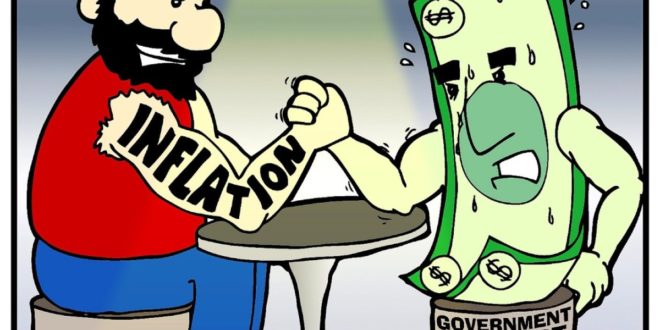Giancarlo Elia Valori
Without my friend Bernard Esambert there would not certainly be the current concept of “economic warfare”.
Having studied at the Ėcole Polytechnicque, he is a natural heir to the best Colbertian, Saint-Simonian, positivist – and later Gaullist – tradition – which pervades the background and education of the modern and post-revolutionary French elites, with governments that pass and ruling classes that remain, as it must always be.
It is no coincidence that, at the beginning of a book he wrote in 1971, Le Trosième Conflict Mondial, Esambert mentioned an old Saint-Simonian song, written by Rouget de Lisle, which glorified science and technology, as the new leaders of peoples after the so-called âge de l’obscurité. Rouget de Lisle, a French army officer, was the poet who wrote the words and music of La Marseillaise.
Two facts that, symbolically, are certainly not by chance.
After having been a mining engineer (and the engineering sector is traditionally a great area of recruitment for the intelligence Services and the French senior management) Esambert became a great commis d’Ėtat. Une vie d’influence, just to recall the title of one of his recent books, Une vie d’influence – dans les coulisses de la Ve République.
Finally, Esambert became a point of reference for Georges Pompidou, who later called him to collaborate with him – as a man of influence – at the Presidency of the Republic.
As Benedetto Croce – a too much forgotten philosopher – used to say, you can always and only implement “the possible liberalism”, well knowing that the real economy is made up of an agreement between private enterprise and State management, which is the one that always really counts.
It has always been and it will always be so. This is the first criterion for setting the scene of an economic warfare which – as Bernard Esambert himself noted for the first time – applies always and everywhere, and is never forgotten, unless severely defeated, even by the modern States that want to win a challenge that always lasts and has never one single face – a warfare, financial, technological, political, cultural and organizational one.
The economic warfare worked well also in ancient Greece: the overpopulation in Athens; the need for commercial outlets in Central Asia; the expansion of Greeks to Southern Italy, where the Bruttians, after having taken their idols with them, hid in the mountains without ever seeing the sea again.
The faces of economic warfare are always manifold and all of them always work. Whoever forgets some of them is always bound to lose.
Certainly there are the current young and brilliant French analysts operating in the intelligence Services and the training sector, who belong to the Ėcole de Guerre Ėconomique (ĖGE) founded precisely by Esambert, based on an old idea developed by Christian Harbulot. There are also the new Italian initiatives in the academic world, all designed more to showing up and flattering the Heads of the intelligence Agencies, for whatever small favours – the usual and often imaginary “small powers” of the Italian academic world, always a bit stingy, after the long season of the roadshow organized by the Intelligence Department (DIS), at the time of the Interior Minister, Marco Minniti, as “Authority responsible for the Intelligence Services”, from 2013 to the end of Renzi’s Government.
In this regard, we should also recall Ambassador Giampiero Massolo, who was the first supporter of the Italian intelligence services’ roadshow in the Italian academic world – now very badly damaged – more to improve the Agencies’ image than to really seek new recruits for the intelligence Services, which have always well selected their people inside and outside the universities, without any need for chattering or showing off.
Moreover, as we all know, the young people who were recruited by means of the website sicurezzanazionale.gov.it were quickly dismissed from the Agencies and now vegetate in other sectors of the Public Administration.
It is not a matter of “young” and “old” people or of creating some fashionable opportunities for declining universities, but rather of ensuring that the whole Italian ruling class endeavours for a well-designed and, above all, stable economic warfare.
As far as I know, for the time being there exists only one specific Master in Economic Intelligence in Italy, organized by the Institute of High Strategic and Political Studies (IASSP) in Milan. I have been told that also Harbulot participated in it.
But once again, this has nothing to do with the decades-long tradition of intelligence and economic ruling class in France, Great Britain and even the United States, not to mention also the small countries that walked out from the Warsaw Pact, with great intelligence and efforts.
It was Esambert himself, already present in an old but already usual and obvious Davos Conference – a now well-known fashionable meeting of those who believe they are authoritative people but, indeed, are nothing – who told about the exit of the old General Jaruzelsky, the strong man of the Polish counter-coup to avoid the occupation by a weak Warsaw Pact, when the old Polish General, whose right-hand man was a NATO spy, openly said he wanted Western investment in Poland and was also ready to progressively liberalize the zloty, as well as finally accept the Western business rules and Western capital coming to Poland.
Obviously subject to the control of the old-but-new-regime.
Here is the real success of an excellent economic warfare – not the many small stories that the globalized rich people usually tell to their useless and always gauchistes children, since it is fashionable.
Incidentally, it should be recalled that even Adam Smith, the inventor of “political economy” according to the basic rules of the British global interests of his time, was a free trade theorist in the markets where Great Britain had to settle, but supported the strictest protectionism, just when it came to closing the national or colonial British markets to the attack of the cheap goods of European competitors and, later, of the 13 colonies that were to become independent on the East Coast of North America.
Here, once again, the problem is scarcity, which just today – as always said by Esambert – seems far away, at least from what Mao Zedong called “the world’s metropolises”.
However, there is instead the natural and induced scarcity. Nowadays we live in induced scarcity, which does not need wars “for raw materials” – as the German geopolitics of the 1930s theorized – but it is the induced scarcity of modern consumption, which needs technology, expert management and States capable of expanding strategically, as well as modern factories. Here it is the new and inevitable economic warfare.
Either we win or lose, but always continuously. In contemporary economic warfare, there is no “declaration of peace”. Quite the reverse.
This is the real core of the issue. If we can no longer build monopolies by managing scarcity – as always happened when modern capitalism was established, according to Adam Smith – how can we today favour the national companies and the typical products of our region, if there are no longer real trade wars, such as the penetration of the East India Company in the Far East and in China, or the British oil trade closures in the Middle East, to take Kurdish oil in Haifa when Churchill, as First Lord of the Admiralty, turned the British military navigation from coal into oil navigation, or the operations of the Belgian royal family alone in Congo, or the French possessions in Algeria, Morocco and Tunisia?
The choice of Habib Bourghiba – Mussolini’s guest in Rome – to secretly deal with De Gaulle’sFrance Libre, when he realized that Rommel and his Afrika Korps were in disarray, can be considered a technique of economic and commercial warfare. He sold his Destour covert network, previously operating with the Axis, in exchange for independence, after the victory of the Western liberal democracies which Habib, indeed, did not like so much.
Lacking a real effective and modern colonial experience, Italy still does not know how to export its productive potential, which is what really counts.
From Giolitti’s to Mussolini’s time, Italy treated its colonies as simple ways out for the rural overpopulation, especially when the exit routes to the United States or South America were blocked.
Italy made the only mistake it should not make.
It even lost the Libyan oil, which was taken back only with the coup of Gaddafi, a creature of Italy’s intelligence Services.
The Italian politicians currently in power support the idea of going abroad to transfer our potential for economic warfare either as door-to-door sellers of the all too famous Made in Italy – which, indeed, almost sells itself – or in search of external and distant areas where to make our agonizing small and medium-sized enterprises survive as long as possible, so as to squeeze every last drop of the labour cost differential.
Either fashion, the brand – now in foreign hands – or begging to prolong the agony of some SMEs which are interesting for political, electoral and financial reasons.
Two attitudes which are deeply wrong – precisely in substance. As Esambert used to say, every country goes to sell abroad certainly not to repeat the plot of the beautiful 1959 movie by Francesco Rosi, The Magliari, set – not by chance – in Germany, but to win and wipe out its competitors.
This movie could teach much to the Italian politicians currently bleating for German “help”. They should watch it again and think about the behaviour of the two main characters -masterfully interpreted by Renato Salvatori and Alberto Sordi – who are defeated when trying to antagonize their Polish rivals, the previous “magliari”.
You never go abroad to propose a factory or a business, but you always go – willingly or unwillingly – to propose a way of doing business, a success story, a lifestyle, a product that must therefore be ipso facto protected, supported, advertised – for which imitations must be stopped, on site and elsewhere, and for which it is necessary to create a stable dependence of the target country and a powerful image in the foreign market of reference.
Nothing to do with the ramshackle, slow, inefficient, impolitic style – all aimed at simply making a deal, at striking a “bargain” – often characterizing our foreign policy, even in countries that Italy should tread very carefully and in which it should proceed with extreme caution.
Foreign countries must be conquered with trade, exactly as they could be conquered with a real battled war, if this were possible today.
In fact, every trade treaty is a peace treaty which, however, must clearly show the will of those who have won, i.e. – in Italy’s specific case – the productive system of those who have come from outside.
Certainly, today even economic wars are no longer made – at least in principle – to support a market that can absorb our surplus.
Marx’s old criterion of surplus value, which is certainly useful today as a way to analyse the evolution of modern capitalism.
As Esambert always says, economic wars are made to create room – outside and inside the old national perimeter – for counteracting and fighting against everybody’s adverse actions – both friends and foes – in our productive system.
Whoever loses faces – without time limits – the disasters of globalization (uncontrolled immigration, pollution, the classic combination of unemployment and inflation), while whoever wins offloads the problems on his global competitors.
And again there is no time limit.
When Spain was still under Franco’s regime, the State of Madrid created an instrument of economic warfare just with SEAT, in 1950, thanks to a small contribution of FIAT capital.
Later in 1985, SEAT became part of the German group Wolkswagen Aktiengesellschaft – created on the basis of an old project by the Führer.
The huge Catalan factory was inaugurated in Martorell by King Juan Carlos in 1993.
FIAT left and VW came in powerfully, with no local or European competitors.
Was it not an economic warfare operation? Of course it was.
At that time, Italy was numbed with the Clean Hands judiciary probe and no one noticed that Germany was taking over Spain’s basic industries after the end of the Caudillo’s regime.
This happened also in other parts of the world.
Starting from the imprisonment and the related suicide of the old ENI President, Cagliari, until the never resolved issues of Gardini’s death, in the connection between the takeover of Montedison and the fanciful creation of Enimont, the whole Clean Hands judicial investigation was, however, an accelerated operation to sell off Italy’s primary industrial system, pending the fall of the Berlin Wall and the truly endogenous crisis of the Italian political system.
There was, at first, the sale of primary assets, ranging from the motorway company Società Autostrade to the food holding SME – of which I had a first-hand experience – and later the redesign of the system of bribes from companies to the political system, which began with ENI’s disruption following Cagliari’s imprisonment, until the creation of a new network of funding to a “new” political system, where all parties were renamed – according to a potentially two-party system – “progressive” and “conservative” or even “liberal”.
Was it not an economic warfare operation? Of course it was. Many large and small companies became attractive to large foreign investors that were favoured, while the Italian State-owned and private companies faded away, struck by the new moralists’ blows.
What happened, at that time, in Mitterrand’s France or in the Great Britain led by Margaret Thatcher who, however, was ousted from Downing Street by a clique of Tories, involved in a large helicopter business affair?
We can also recall Liu Tenan, the Chinese Head of the “Development Commission”, expelled from the CPC; Rouhani himself in Iran that saw the 1979 Revolution in danger because of corruption, or Ana Mato, the Health Minister who resigned because of the scandal that in 2014 sullied the reputation of the entire Partido Pupular in Spain – not to mention the fact at least 2.3% of the world GDP fuels global corruption.
Can we believe that all this came only from what had happened in Italy?
Once again the usual moralistic parochialism sets in, a short-lived legacy of the snobbery of Italy’s old Action Party, whose liberal Socialism – taunted by Croce – led Italy to be a pale imitation of Great Britain, the eternal myth of all poor politicians and managers wearing grisaille suits.
Hence the final formula: the mix of legal and non-legal, advertising, political, military, strategic and monetary protection and support for the local ruling classes, as well as the fair and rational relations with the target country, are called exactly “economic warfare”.
There is no other way to make foreign policy and establish international relations, even non-economic ones. There is only and always economic warfare.
Hence, after this explicit and direct phase of the inevitable economic clash for survival between nations, there is the phase in which “companies are used as armies and management and business schools are used as schools for officers”, and entrepreneurs and business leaders are seen as new generals. In fact Akira Kurosawa, the director of the movie Seven Samurai and a descendant from a Samurai family, wanted – in a later movie of 1980, Kagemusha (Shadow Warrior) – to describe Japanese business leaders as new Samurai.
Every economic action is a “covert” act of war. Every act of war can also be turned into an economic action, which instead of being a cost – unsustainable in the long run – is a real bargain or can even become so.
Economic warfare shifts the cost of operations onto the victim.
Attractiveness and competitiveness are now complementary, while Italy is the 7th world exporter of goods, but it only ranks 18th in terms of Foreign Direct Investment (FDI) in the territory.
The current FDI is an instrument of external hegemony, not a system of national power or of projection of our economic and non-economic power onto the countries that receive our goods or that – in any case – should consume them, instead of our competitors’ products.
The economic warfare also stems from the fact that all the great Western countries produce more or less the same goods.
Nevertheless, in Italy 43% of the companies currently listed on the Stock Exchange are owned by foreign businesses. Obviously, there is no direct correlation between the quality of management of the various industries and their ownership. However, do you believe that if a French bank manager has to organize a strategy for his own company, he will pay heed to the large multifarious group of his small investors – as currently happens in Italy – or will he rather consider the ideas coming from some State think tanks in Paris, or possibly from one of his Ministers, or even from a colleague in Lyon or Grenoble?
According to the 2018 data, in Italy the foreign investors’ shareholdings of listed companies currently amount to 196.4 billion euro, i.e. 43% of the total.
The shareholdings of listed joint stock companies owned by Italian businesses are worth 25.8%, with the State holding 2.7% of the total portfolio. Hence it is certainly not difficult to imagine that, in this framework of international economic equilibria, Italy would have an extreme need for a policy of economic warfare.
This also applies to cultural or humanitarian operations.
Goodness knows what the organization Mèdecins sans Frontières was for France, or the management of the U.S. or Canadian grain overproduction was for the U.S. power projection policy in third countries or in those suffering humanitarian crises.
Whoever eats your wheat becomes your friend, whoever is saved by your doctors will never make war on you but, above all, will gladly buy your products, when the crisis is over and France or the United States will present local governments with the bill for its humanitarian operations.
Moreover, in 2011 the Italian multinationals were as many as 6,500 Italian, while currently they are decidedly fewer and often smaller.
Not to mention Italy’s cultural and hegemonic penetration – virtually nothing, apart from a few old-style and ramshackle elite operations for socialites.
We need more than beautiful girls, superstar chefs or art exhibitions. It takes guts to penetrate and hegemonize a distant market. It is an operation in which companies and the intelligence Services shall participate simultaneously, and shall be ever less tied to the cliques of revolving-door government and also less parochial in their actions. Even humanitarian organizations, some universities – less familist than usual – as well as the fashion world, newspapers, TV networks, cinema and all the many other instruments of attraction and seduction shall take part in this operation.
An operation which, however, must be stable and well-designed, otherwise we risk repeating what happened when an Italian President of the Republic, while visiting the Chinese Great Wall, learnt that the German Prime Minister was coming for a flying visit to Beijing so as to sign an agreement between the German and Chinese large car manufacturers.
A dinner, some greetings and a quick return to Berlin.
Unless the full criterion of the “economic warfare” is followed – as must be done according to Bernard Esambert’s guidelines – Italy will always be relegated to the sidelines of the great global economic development and it will not reap the fruits but only the damage of globalization – as is already currently happening.
GIANCARLO ELIA VALORI
Honorable de l’Académie des Sciences de l’Institut de France
President of International World Group
 Geostrategic Media Political Commentary, Analysis, Security, Defense
Geostrategic Media Political Commentary, Analysis, Security, Defense





